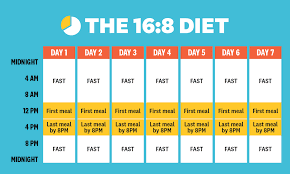I have been reading lately about Early Time-Restricted Eating as a way to lose weight. It seems pretty straight-forward and not very hard. I decided to post about it here so you can see what it is and let me know what you think about it, too.
The concept of when we eat has gained as much attention as what we eat. One such approach that has garnered significant interest is Early Time-Restricted Eating (eTRE). This dietary approach focuses on narrowing the eating window and aligning it with our body's natural circadian rhythm. Emerging research suggests that eTRE might play a pivotal role in preventing type-2 diabetes and aiding weight loss. Let's look deeper into this intriguing topic.
What is Early Time-Restricted Eating (eTRE)?
Early Time-Restricted Eating is a form of intermittent fasting where individuals consume all their daily calories within a limited timeframe, typically 6-8 hours, and then fast for the remaining 16-18 hours. Unlike other intermittent fasting methods, eTRE emphasizes eating earlier in the day, aligning with our body's internal clock.
The Circadian Rhythm Connection
Our body operates on a circadian rhythm, a 24-hour internal clock that regulates various physiological processes. This rhythm affects everything from hormone production to digestion. Research has shown that our insulin sensitivity, the hormone responsible for regulating blood sugar, is higher in the morning and decreases as the day progresses. By eating earlier, eTRE aims to leverage this natural rhythm, potentially leading to better metabolic outcomes.
eTRE and Type-2 Diabetes Prevention
1.Improved Insulin Sensitivity:
As mentioned, our bodies are more insulin-sensitive in the morning. Consuming the bulk of our calories during this period can lead to more efficient glucose uptake by cells, reducing the risk of insulin resistance, a precursor to type-2 diabetes.
2.Reduced Evening Snacking:
Evening snacking, especially on high-calorie, sugary foods, can lead to prolonged elevated blood sugar levels. By restricting eating to earlier in the day, eTRE can reduce the likelihood of these unhealthy eating habits.
3.Enhanced Fat Oxidation:
Extended fasting periods, as seen in eTRE, can shift the body's energy source from glucose to stored fat, promoting fat oxidation and reducing the risk of obesity, a significant risk factor for type-2 diabetes.
eTRE and Weight Loss
1.Caloric Reduction:
By narrowing the eating window, many individuals naturally consume fewer calories. This inadvertent caloric reduction can lead to weight loss over time.
2.Boosted Metabolism:
Some studies suggest that aligning eating patterns with circadian rhythms can enhance metabolic rate, further promoting calorie burning.
3.Hormonal Benefits:
Fasting periods in eTRE can lead to increased production of norepinephrine and a decrease in insulin levels, both of which can promote fat breakdown and inhibit fat storage.
Considerations and Caveats
While eTRE shows promise, it's essential to approach it with a balanced perspective:
- -Individual Variation: eTRE might not be suitable for everyone. Some people may find it challenging to consume enough nutrients in a restricted window or may feel overly fatigued or hungry.
- -Potential Nutrient Deficiency: If not done mindfully, eTRE can lead to inadequate nutrient intake. It's crucial to focus on nutrient-dense foods during the eating window.
- -Medical Conditions: Individuals with certain medical conditions or those on specific medications should consult with a healthcare professional before starting eTRE or any form of intermittent fasting.
Early Time-Restricted Eating offers an exciting avenue for those looking to optimize their metabolic health and manage their weight. By aligning our eating patterns with our body's natural rhythms, we might be better positioned to prevent chronic conditions like type-2 diabetes.
However, as with any dietary approach, it's essential to tailor it to individual needs and always prioritize overall well-being. It is also important that we discuss this type of eating with a medical professional before starting this program. Not all people can consume the correct nutrition in such a short amount of time and may need to talk to a dietician to get a program to provide correct nutrition.








